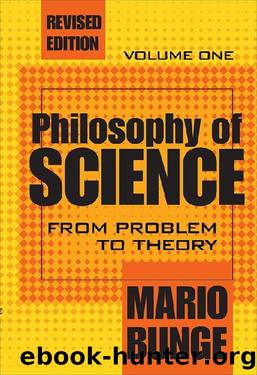Philosophy of Science Volume 1 by Mario Bunge

Author:Mario Bunge [Bunge, Mario]
Language: eng
Format: epub
Publisher: Taylor and Francis
Published: 2017-07-12T00:00:00+00:00
Fig. 5.5 The theorem on the right branch of the tree entails no emprically testable consequence: it can be supported or undermined from above only.
Finally, we shall not demand the testability of every formula occurring in science because certain formulas, although fruitful, are incapable of being even false. These are, in addition to the rules of inference, the formulas of the following kinds: (i) rules of method, (ii) conventions, such as those regarding units, and (iii) criteria for evaluating pieces of science, e.g., testability criteria. None of the formulas of these kinds can be tested for truth, but all of them should be tested for either convenience or fruitfiilness. Thus, a rule of method that does not lead to the desired result is pronounced fruitless; and a rule of method that cannot be checked as to fruitfiilness is clearly undesirable. We can require the testability of every piece of science on condition that we widen the concept of testability to include the pragmatic testability of a formula, that is, the possibility of showing that the formula is, or is not, convenient or fruitful.
In short, we lay down a liberal criterion of testability, according to which every hypothesis (not every formula) must be at least confirmable—preferably refutable as well—either directly or indirectly.
We are now prepared to collect all the requirements we have so far imposed on scientific hypotheses.
Problems
5.6.1. Examine the singular hypothesis: “It snowed on Manhattan Island on the first of January in the year 1 A.D.”, discussed by B. Russell in An Inquiry into Meaning and Truth (London: Allen & Unwin, 1940), pp. 277ff. Is it meaningful, empirically testable, grounded, and/ or verisimilar? And could you alter it so as to render it more likely?
5.6.2. Examine the testability of the following ideas, (i) “Whatever happens is the work of the Providence”, (ii) “Mishaps are either a punishment for sins or a test of faith”, (iii) “Whatever happens is historically necessary”, (iv) “Whenever an epoch needs a great man it begets him”, (v) “Birds can learn to follow the movements of almost any suitable object” (read in a study of animal behavior).
5.6.3. Examine the following conjectures as to testability, (i) “The cause of every social change is some economic process”, (ii) “The ideas of an epoch depend on the mode of production prevailing during that epoch.” (iii) “All animal species are the modifications of an original type (Urtier), the eternal morphological model copied more or less successfully by the various real species” (Goethe).
5.6.4. C. G. Jung stated that outwardly extroverted persons are inwardly introverted and vice versa: i.e., that people who behave as if they were extroverted are unconsciously introverted and conversely. Examine the testability of this conjecture.
5.6.5. Examine the testability of the following psychoanalytic hypotheses, (i) “Infants derive sexual pleasure from performing their excretory functions”, (ii) “All males have an Oedipus complex, whether in a manifest or in a repressed form”, (iii) “The critics of psychoanalysis illustrate the psychoanalytic hypotheses of the aggressive instinct and of the defense mechanism (unconscious protection of something the subject wishes to conceal)”.
Download
This site does not store any files on its server. We only index and link to content provided by other sites. Please contact the content providers to delete copyright contents if any and email us, we'll remove relevant links or contents immediately.
| Arms Control | Diplomacy |
| Security | Trades & Tariffs |
| Treaties | African |
| Asian | Australian & Oceanian |
| Canadian | Caribbean & Latin American |
| European | Middle Eastern |
| Russian & Former Soviet Union |
The Secret History by Donna Tartt(16605)
The Social Justice Warrior Handbook by Lisa De Pasquale(11484)
Thirteen Reasons Why by Jay Asher(7777)
This Is How You Lose Her by Junot Diaz(5747)
Weapons of Math Destruction by Cathy O'Neil(5027)
Zero to One by Peter Thiel(4814)
The Myth of the Strong Leader by Archie Brown(4783)
Promise Me, Dad by Joe Biden(4439)
Stone's Rules by Roger Stone(4409)
Beartown by Fredrik Backman(4398)
How Democracies Die by Steven Levitsky & Daniel Ziblatt(4391)
The Fire Next Time by James Baldwin(4336)
100 Deadly Skills by Clint Emerson(4069)
A Higher Loyalty: Truth, Lies, and Leadership by James Comey(4024)
Rise and Kill First by Ronen Bergman(4006)
The David Icke Guide to the Global Conspiracy (and how to end it) by David Icke(3874)
The Farm by Tom Rob Smith(3868)
Secrecy World by Jake Bernstein(3773)
The Doomsday Machine by Daniel Ellsberg(3725)
